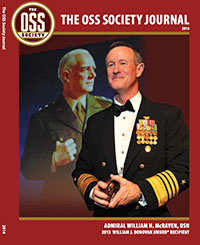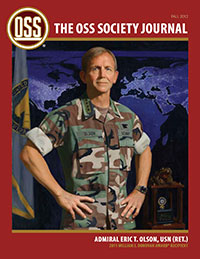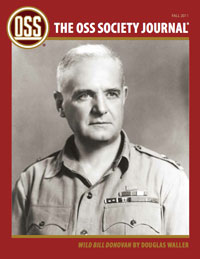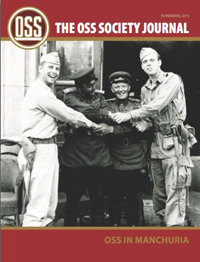OSS Invasion of Martha's Vineyard
August 2008 Author:Charles Pinck
By Charles Pinck
The Martha's Vineyard Times
August 28, 2008
Earlier this month the National Archives released personnel files from World War II's Office of Strategic Services (OSS), the predecessor to the Central Intelligence Agency and U.S. Special Forces, which was founded and led by the legendary Major General William "Wild Bill" Donovan, the only American to receive our nation's four highest military honors. OSS luminaries included famed chef Julia Child, Kennedy aide Arthur Schlesinger Jr., Nobel Prize winner Ralph Bunche, movie director John Ford, Supreme Court Justice Arthur Goldberg, actor Sterling Hayden, writer John O'Hara, the artist Saul Steinberg, baseball player Moe Berg, among many others. General Donovan called them his "glorious amateurs."
OSS was a perfect reflection of General Donovan's character: a potent combination of brains, brawn, and bravado. General Donovan encouraged OSS personnel to take risks, frequently telling OSS personnel that, "you can't succeed without taking chances." Leading by example, General Donovan took the same risks himself. Members of OSS volunteered for the most dangerous missions of World War II behind enemy lines to conduct sabotage and guerilla warfare and work with local resistance groups. Their capture by the enemy meant certain death.
Intelligence provided by OSS was critical to the success of Operation Torch, the invasion of North Africa. Allen Dulles, chief of OSS operations in Switzerland, secretly negotiated the early surrender of German troops in Northern Italy. Fritz Kolbe, a German diplomat and an OSS asset, provided the U.S. with some of the most valuable intelligence of the war. Some of the most significant contributions came from leading academics in its Research and Analysis division. The Science and Technology branch devised imaginative new weapons and other espionage tools.
The Martha's Vineyard Times
August 28, 2008
Earlier this month the National Archives released personnel files from World War II's Office of Strategic Services (OSS), the predecessor to the Central Intelligence Agency and U.S. Special Forces, which was founded and led by the legendary Major General William "Wild Bill" Donovan, the only American to receive our nation's four highest military honors. OSS luminaries included famed chef Julia Child, Kennedy aide Arthur Schlesinger Jr., Nobel Prize winner Ralph Bunche, movie director John Ford, Supreme Court Justice Arthur Goldberg, actor Sterling Hayden, writer John O'Hara, the artist Saul Steinberg, baseball player Moe Berg, among many others. General Donovan called them his "glorious amateurs."
OSS was a perfect reflection of General Donovan's character: a potent combination of brains, brawn, and bravado. General Donovan encouraged OSS personnel to take risks, frequently telling OSS personnel that, "you can't succeed without taking chances." Leading by example, General Donovan took the same risks himself. Members of OSS volunteered for the most dangerous missions of World War II behind enemy lines to conduct sabotage and guerilla warfare and work with local resistance groups. Their capture by the enemy meant certain death.
Intelligence provided by OSS was critical to the success of Operation Torch, the invasion of North Africa. Allen Dulles, chief of OSS operations in Switzerland, secretly negotiated the early surrender of German troops in Northern Italy. Fritz Kolbe, a German diplomat and an OSS asset, provided the U.S. with some of the most valuable intelligence of the war. Some of the most significant contributions came from leading academics in its Research and Analysis division. The Science and Technology branch devised imaginative new weapons and other espionage tools.
Legend has it that General Donovan brought a silenced 22-caliber pistol developed by OSS into the Oval Office to show President Roosevelt, who was on the phone at the time. Donovan fired it into a pillow to prove how quiet it was. After hanging up, President Roosevelt told General Donovan that he was the only Republican allowed into the Oval Office with a gun.
Another OSS story involves John Hemingway, Ernest Hemingway's son. An avid fisherman, Hemingway brought a fly fishing rod with him behind enemy lines. A security officer examining Hemingway's equipment prior to his parachute jump in Europe asked him about it. Hemingway told him it was an antenna used for top-secret communication.
Martha's Vineyard played a little-known role in the history of OSS. Major Serge Obolensky led a team of OSS Operational Group trainees - forerunners of today's U.S. Special Forces - in an amphibious training raid in which they were to simulate an attack behind enemy lines at night. The target was the Gay Head radar station.
Major Obolensky was a member of Russian aristocracy and a notable figure within OSS. He gained renown when, as the U.S. Army's oldest paratrooper at age 53, he led a daring parachute drop into Sardinia, carrying General Eisenhower's letters and successfully talking the Italians into surrendering.
Major Obolensky's and his group's orders were to arrive on the Vineyard by landing craft, place marks on various buildings as proof of their visit in lieu of actual explosives, and then withdraw - all undetected.
The OSS team came across the Vineyard Sound from Camp Edwards on Cape Cod, dressed in camouflage and wearing black makeup. After arriving at Gay Head, they encountered a fence that was being patrolled. A truck drove past and they took the driver and tied him up. They used his truck to drive into the radar station they were supposed to "destroy." After marking the building as ordered, they returned to their boats, released the driver, and returned to Cape Cod. They said nothing about their "hostage" upon returning to Camp Edwards.
Mr. Obolensky described the incident in his memoir published in 1958, entitled One Man in His Time.
"But the truck driver was sore as hell. When he finally got untied late that night, he went racing over to the police and said a huge army of goons had taken over Martha's Vineyard. He said that black men all covered with grease had climbed out of the ocean and attacked him. The authorities there had one immediate reaction: they pulled all panic switches, sirens blew, searchlights were turned on, and telephone calls went to Washington, to the army, air force, navy, marines. We got into a lot of trouble about that." Rumors swept the Island about an invasion.
Training exercises such as the one that took place on Martha's Vineyard would prove critical to the success of OSS operations overseas.
Another OSS story involves John Hemingway, Ernest Hemingway's son. An avid fisherman, Hemingway brought a fly fishing rod with him behind enemy lines. A security officer examining Hemingway's equipment prior to his parachute jump in Europe asked him about it. Hemingway told him it was an antenna used for top-secret communication.
Martha's Vineyard played a little-known role in the history of OSS. Major Serge Obolensky led a team of OSS Operational Group trainees - forerunners of today's U.S. Special Forces - in an amphibious training raid in which they were to simulate an attack behind enemy lines at night. The target was the Gay Head radar station.
Major Obolensky was a member of Russian aristocracy and a notable figure within OSS. He gained renown when, as the U.S. Army's oldest paratrooper at age 53, he led a daring parachute drop into Sardinia, carrying General Eisenhower's letters and successfully talking the Italians into surrendering.
Major Obolensky's and his group's orders were to arrive on the Vineyard by landing craft, place marks on various buildings as proof of their visit in lieu of actual explosives, and then withdraw - all undetected.
The OSS team came across the Vineyard Sound from Camp Edwards on Cape Cod, dressed in camouflage and wearing black makeup. After arriving at Gay Head, they encountered a fence that was being patrolled. A truck drove past and they took the driver and tied him up. They used his truck to drive into the radar station they were supposed to "destroy." After marking the building as ordered, they returned to their boats, released the driver, and returned to Cape Cod. They said nothing about their "hostage" upon returning to Camp Edwards.
Mr. Obolensky described the incident in his memoir published in 1958, entitled One Man in His Time.
"But the truck driver was sore as hell. When he finally got untied late that night, he went racing over to the police and said a huge army of goons had taken over Martha's Vineyard. He said that black men all covered with grease had climbed out of the ocean and attacked him. The authorities there had one immediate reaction: they pulled all panic switches, sirens blew, searchlights were turned on, and telephone calls went to Washington, to the army, air force, navy, marines. We got into a lot of trouble about that." Rumors swept the Island about an invasion.
Training exercises such as the one that took place on Martha's Vineyard would prove critical to the success of OSS operations overseas.







